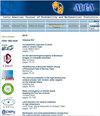反应扩散模型中罕见事件的指数慢混合和撞击次数
IF 0.6
4区 数学
Q4 STATISTICS & PROBABILITY
Alea-Latin American Journal of Probability and Mathematical Statistics
Pub Date : 2021-05-27
DOI:10.30757/alea.v19-48
引用次数: 0
摘要
。考虑了一维周期边界条件下,随时间加速的对称简单不相容动力学与自旋翻转动力学的叠加。我们证明,如果流体动力方程的势有两个或两个以上的局部极小值,则混合时间在系统大小中具有指数下界。我们还应用我们的估计表明,如果势具有唯一的最小值,则稀有事件的归一化命中时间收敛于平均一个指数随机变量。偏差的准势和解本文章由计算机程序翻译,如有差异,请以英文原文为准。
Exponentially slow mixing and hitting times of rare events for a reaction–diffusion model
. We consider the superposition of symmetric simple exclusion dynamics speeded-up in time, with spin-flip dynamics in a one-dimensional interval with periodic boundary conditions. We show that the mixing time has an exponential lower bound in the system size if the potential of the hydrodynamic equation has two or more local minima. We also apply our estimates to show that the normalized hitting times of rare events converge to a mean one exponential random variable if the potential has a unique minimum. deviation the quasi-potential and solutions to the
求助全文
通过发布文献求助,成功后即可免费获取论文全文。
去求助
来源期刊

Alea-Latin American Journal of Probability and Mathematical Statistics
STATISTICS & PROBABILITY-
CiteScore
1.10
自引率
0.00%
发文量
48
期刊介绍:
ALEA publishes research articles in probability theory, stochastic processes, mathematical statistics, and their applications. It publishes also review articles of subjects which developed considerably in recent years. All articles submitted go through a rigorous refereeing process by peers and are published immediately after accepted.
ALEA is an electronic journal of the Latin-american probability and statistical community which provides open access to all of its content and uses only free programs. Authors are allowed to deposit their published article into their institutional repository, freely and with no embargo, as long as they acknowledge the source of the paper.
ALEA is affiliated with the Institute of Mathematical Statistics.
 求助内容:
求助内容: 应助结果提醒方式:
应助结果提醒方式:


